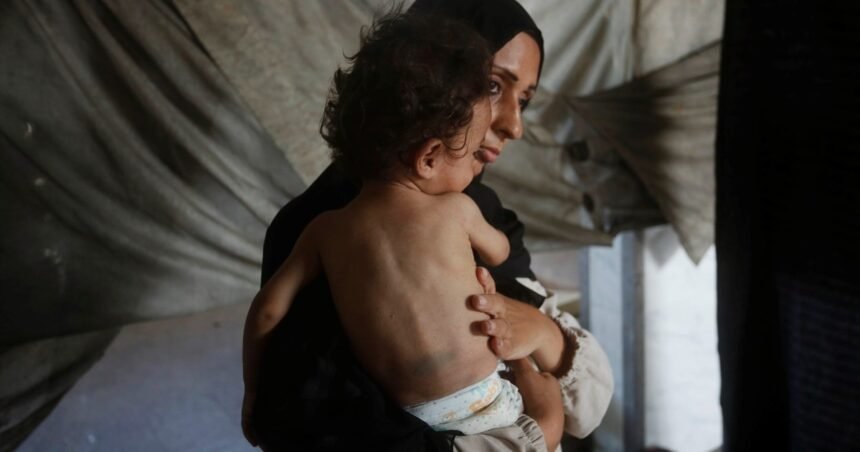For greater than 21 months, a lot of the worldwide media danced across the reality about Israel’s battle on Gaza. The previous newsroom cliche – “if it bleeds, it leads” – appeared to use, for Western media newsrooms, extra to Ukraine than Gaza. When Palestinian civilians had been bombed of their houses, when total households had been buried beneath rubble, protection got here slowly, cautiously and sometimes buried in “each side” framing.
However when the photographs of ravenous Palestinian youngsters started to emerge – haunting faces, skeletal limbs, vacant stares – one thing shifted. The images had been too visceral, too plain. Western audiences had been confronted with what the siege of Gaza actually means. And for as soon as, the media’s gatekeepers couldn’t solely look away.
The world’s consideration, nonetheless, alerted Israel, and a brand new “hasbara” operation was deployed. Hasbara means “explaining”, however in apply, it’s about erasing. With Tel Aviv’s steering, pro-Israel media operatives got down to “debunk” the proof of famine. The strategy was absolutely Orwellian: Don’t simply contest the info. Contest the eyes that see them.
We had been instructed there is no such thing as a hunger in Gaza. By no means thoughts that Israeli ministers had publicly vowed to dam meals, gasoline and medication. By no means thoughts that vehicles had been stopped for months, generally vandalised by Israeli settlers in broad daylight.
Israeli officers, talking in polished English to Western media, assured the general public this was all a Hamas fabrication, as if Hamas had in some way managed to trick help companies, international medical doctors and each journalist in Gaza into staging starvation.
The propaganda machine thought it had struck gold with one {photograph}. A New York Instances picture confirmed a skeletal boy, Mohammad Zakariya Ayyoub al-Matouq. Israeli intelligence sources whispered to pleasant retailers: He’s not ravenous. He has a medical situation. As if that in some way makes his horrific situation acceptable.
The Instances went forward and added an editor’s be aware to “right” the file.
That’s how hasbara works – not by persuading individuals however by exhausting them. By turning each truth right into a dispute, each picture right into a row. By pushing editors to “steadiness” {a photograph} of an emaciated little one with a authorities information launch denying he’s hungry.
Think about a climate report the place one supply says, “It’s raining,” and one other insists, “No, it’s sunny,” whereas everybody stands outdoors, soaked from the downpour. Gaza is that drenched reality, and but a lot of the Western information media nonetheless feels obliged to cite the weatherman in Tel Aviv.
Each trustworthy report is met with a barrage of emails, telephone calls and social media smears, all designed to create simply sufficient doubt to make editors pull again.
However the declare “He’s not ravenous. He’s simply sick” shouldn’t be an exoneration. It’s an admission.
A toddler with a pre-existing medical situation who is dropped at the purpose of trying like a skeleton means he has been disadvantaged not solely of the vitamin he wants, however of the medical care. That is pressured hunger and medicide facet by facet.
Palestinian journalists inside Gaza, the one ones reporting since Israel banned all international media and killed greater than 200 Palestinian journalists, are ravenous alongside the individuals they report on. In a uncommon joint assertion, the BBC, AFP and Related Press warned that their very own employees members face “the identical dire circumstances as these they’re masking”.
On the top of the outrage over these photographs final week, Israel allowed in a trickle of help – some airdrops and 30 to 50 vehicles a day when the United Nations says 500 to 600 are wanted. Some vehicles by no means arrived, blocked by Jewish extremists.
In the meantime, a parallel mechanism for help distribution has been funnelled by means of Israeli-approved American contractors, which purposefully create harmful and chaotic situations that result in day by day killings of help seekers. Crowds of ravenous Palestinians collect, solely to be shot at by Israeli troopers.
And nonetheless, the denials persist. The official line is that this isn’t hunger. It’s one thing else – undefined however positively not a battle crime.
The world has seen famine earlier than – in Ethiopia, in Somalia, in Yemen, in South Sudan. The images from Gaza belong in the identical class. The distinction is that right here, a strong state inflicting the hunger is actively attempting to persuade us that our personal eyes are mendacity to us.
The aim is to not persuade the general public that there is no such thing as a starvation however to plant sufficient doubt to paralyse outrage. If the info might be made murky, the stress on Israel diminishes. Because of this each newsroom that avoids the phrase “hunger” turns into an unwitting confederate.
Hunger in Gaza shouldn’t be collateral harm. It’s an instrument of battle, measurable in energy denied, vehicles blocked and fields destroyed.
Israel’s technique depends upon controlling the lens in addition to the border. It goes so far as prohibiting journalists allowed on airplanes airdropping meals from filming the devastation under.
For a quick second, the publication of these photographs of ravenous Palestinians broke by means of the wall of propaganda, prompting minimal concessions. However the siege continues, the starvation deepens and the mass killing expands. Now the Israeli authorities has determined to launch one other floor offensive to occupy Gaza Metropolis, and with it, the genocide will solely worsen.
Historical past will file the famine in Gaza. It’s going to keep in mind the costs of flour and sugar, the names of youngsters and the help vehicles turned again. And it’ll keep in mind how the world allowed itself to be instructed, in the midst of a downpour, that the sky was clear.
The views expressed on this article are the writer’s personal and don’t essentially replicate Al Jazeera’s editorial stance.
